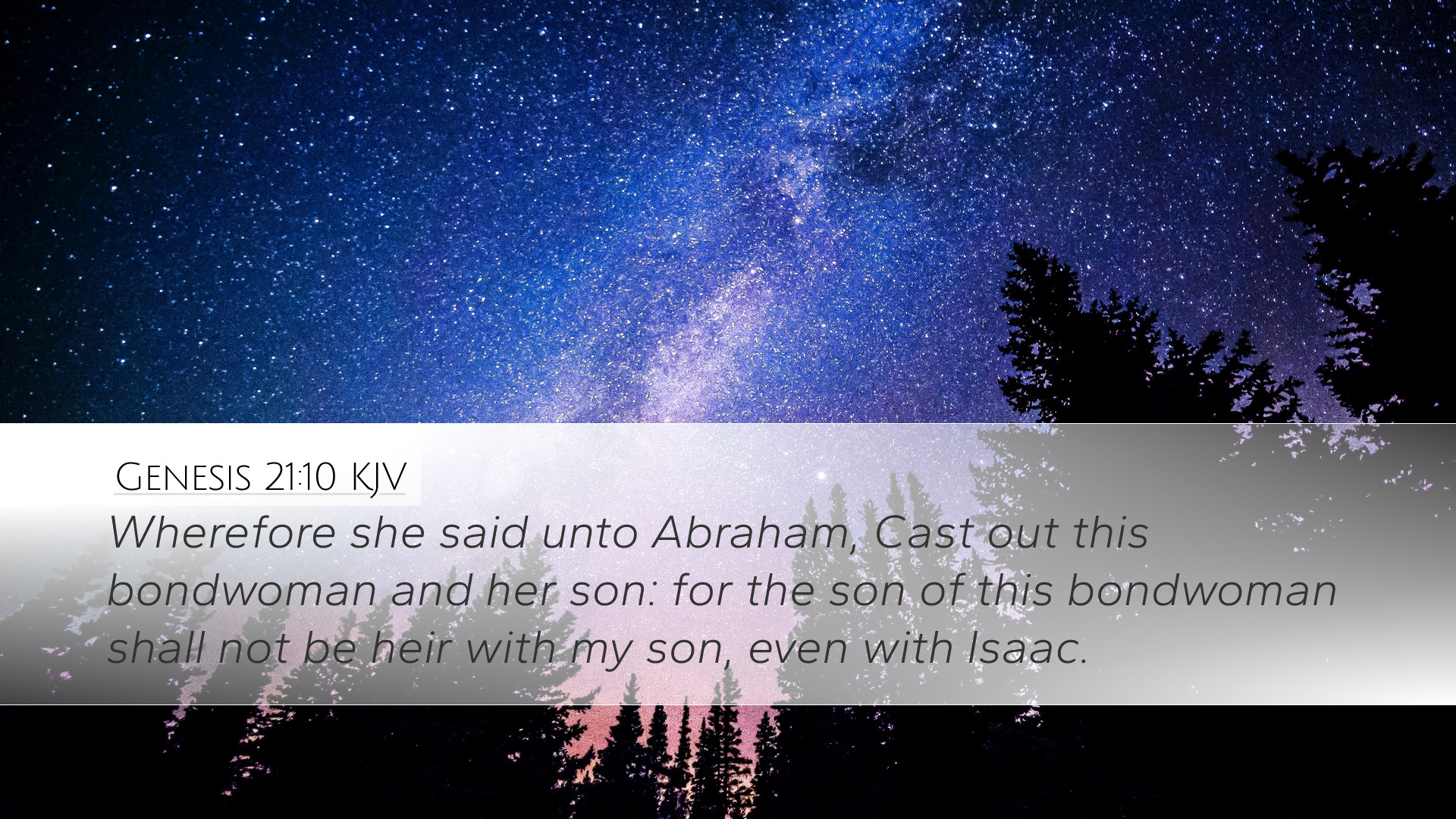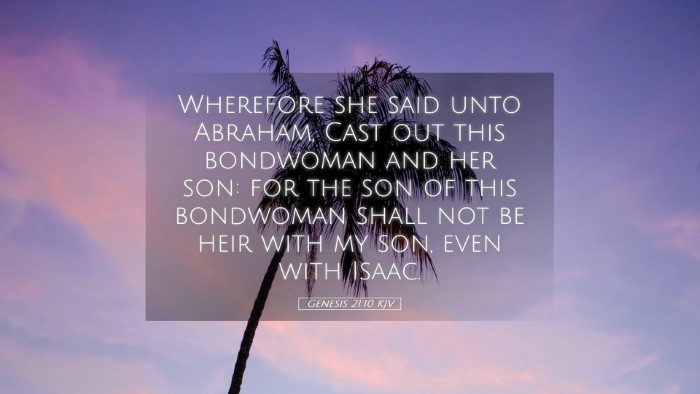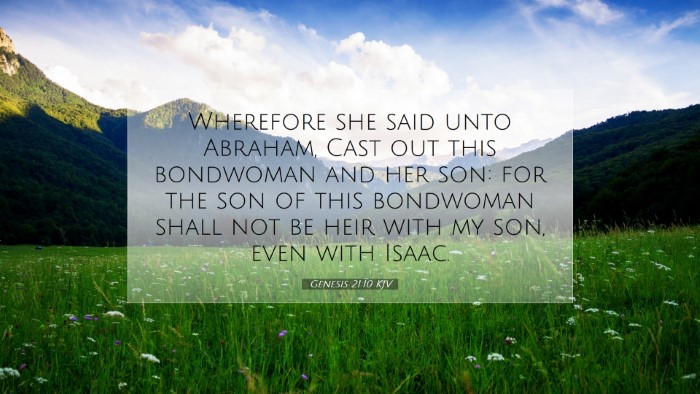Commentary on Genesis 21:10
Verse: "Wherefore she said unto Abraham, Cast out this bondwoman and her son: for the son of this bondwoman shall not be heir with my son, even with Isaac."
Introduction
Genesis 21:10 presents a pivotal moment in the narrative of Abraham, Sarah, and Hagar, filled with emotional and theological significance. In this verse, we see the intensity of Sarah's feelings toward Hagar and her son Ishmael. The context of this request reveals deep-seated issues surrounding identity, legitimacy, and the inheritance promises made by God. This commentary will explore the insights of respected public domain commentators, drawing from the works of Matthew Henry, Albert Barnes, and Adam Clarke to highlight the spiritual and doctrinal implications of this passage.
Contextual Background
The story of Abraham's family is marked by complex relationships and divine promises. We begin our analysis by understanding the background leading up to Genesis 21:10:
-
Abraham's Covenant: God had established a covenant with Abraham, promising that he would be the father of a great nation through Sarah, his wife (Genesis 17). Despite their advanced ages, God’s promise hinged on Isaac, the child of promise.
-
Hagar and Ishmael: Due to doubts concerning God’s promise, Sarah gave her servant Hagar to Abraham to bear a child, resulting in Ishmael's birth. This act represented a lack of faith in God's timing and plan, leading to a rivalry between the two women and their sons.
Insights from Commentators
Matthew Henry
Matthew Henry emphasizes the emotional depth of Sarah's request. He notes that Sarah’s demand to cast out Hagar and Ishmael highlights the legitimate fears of a God-given inheritance being diluted. In Sarah’s view, Ishmael represented a challenge to the purity of her son's legacy, a reflection of the tension between divine promise and human intervention.
Henry discusses the implications of "bondwoman," categorizing Hagar not only as a servant but as an embodiment of sin and the flesh. He argues that Sarah’s reaction is not solely personal but serves a broader theological narrative, representing the separation between those who live by faith (Isaac) and those who rely on human schemes (Ishmael).
Albert Barnes
Albert Barnes examines the legal and social ramifications of Sarah's command. He points out that in ancient societies, inheritance laws were critical in determining legitimacy and status. Barnes articulates that Sarah's plea was not merely a personal vendetta but a necessary action to secure Isaac’s place in the covenant community.
Moreover, Barnes highlights the emotional turmoil of Abraham, who loved Ishmael. He discusses God's assurance to Abraham shortly after this event, affirming that God also heard Ishmael's cries, which introduces a comforting dimension to God’s character—reflecting His concern for all people, regardless of their lineage.
Adam Clarke
Adam Clarke provides an exegetical approach that closely analyzes the Hebrew terms used in Genesis 21:10. He indicates that this command from Sarah reflects a culmination of years of tension between the two families. Clarke suggests that Sarah’s statement was driven by a protective instinct for her son, indicating a mother's fierce desire for her child's rightful status.
Clarke also addresses the broader implications of the term "cast out," connecting it to themes of spiritual rejection and the need to distance oneself from sinful influences. He reflects on how this act serves as a foreshadowing of New Testament teachings regarding the conflicts between the flesh and the spirit, making this historical episode relevant to contemporary readers.
Theological Reflections
The command to "cast out" raises significant theological questions about inclusion, exclusion, and divine purpose. This act can be compared to the concepts of separation in the teachings of Christ, where believers are called to live in accordance with God’s will, rejecting influences contrary to His command.
-
The Role of Faith: This narrative encourages readers to reflect on their own lives regarding faith and doubt. Like Sarah, believers may sometimes take matters into their own hands, leading to unintended consequences that may affect future generations.
-
Divine Sovereignty: God’s response to both Sarah and Abraham demonstrates His sovereignty. He assures that both Isaac and Ishmael have distinct purposes under His divine plan, reinforcing that all humanity is under God’s watchful care regardless of circumstances.
Practical Applications
For pastors, students, and theologians, Genesis 21:10 provides fertile ground for preaching and teaching. Understanding the depths of human emotion, the complexities of divine promise, and the realities of family dynamics can guide effective ministry and pastoral care.
-
Human Relationships: The narrative showcases the necessity of addressing conflict and competition within families and communities of faith. Lessons on forgiveness, understanding, and reconciliation are pivotal.
-
Trust in God: It serves as a reminder to maintain faith in God’s promises and timing. Faith communities can draw strength from this passage in encouraging trust over anxiety.
Conclusion
Genesis 21:10, while a narrative about familial discord, opens broader discussions about faith, human action, and divine response. The combined insights of Matthew Henry, Albert Barnes, and Adam Clarke enrich the understanding of this verse, providing layers of meaning that are applicable to personal faith, church matters, and critical theological discourse. As we study this interaction, we are reminded of the diverse trajectories of God's promises and the call for all believers to hold fast to faith amidst life's complexities.


